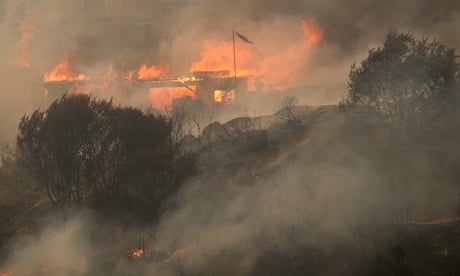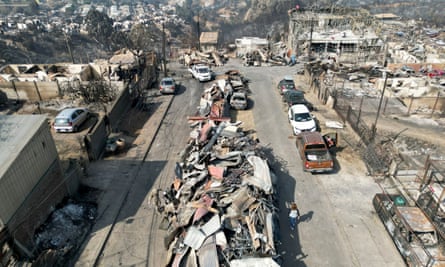Chile has begun two days of mourning for the 112 so far killed in the country’s deadliest wildfires in recent history, while authorities continued to battle blazes fanned by high temperatures and strong winds.
Fires that broke out in central Chile late last week gathered momentum throughout the weekend, ravaging the coastal cities of Viña del Mar and Valparaiso. Hundreds of people remain missing and some 14,000 homes have been damaged.
Whole neighborhoods in the city of Viña del Mar were left scorched, with residents rummaging through husks of burnt-out houses where corrugated iron roofs have collapsed. On the streets, singed cars littered the roads.
“From one moment to the next, the fire reached the botanical park. In 10 minutes the fire was already on us,” said Vina del Mar resident Jesica Barrios, who lost her home in the fires.

“There was smoke, the sky turned black, everything was dark. The wind felt like a hurricane. It was like being in hell.”
On Sunday night, the deputy interior minister, Manuel Monsalve, said there were still 165 active fires, up from 154 on Saturday. A curfew has been imposed in the hardest-hit regions and the military has been sent in to help firefighters stop the spread.
Monsalve said slightly lower temperatures and cloud cover could help authorities put out the fires in coming days.
“We’re going to keep having high temperatures, but not extreme ones,” Monsalve said at a press conference.

Chile’s investigative police force (PDI) has said it was investigating areas where fires might have been started intentionally and local media reported on Monday that two suspects had been detained on suspicion of starting fires.
Chile, Argentina and other areas in South America’s southern cone have been facing a severe heat wave, something experts say will become more common during the southern hemisphere summer months due to climate change.
Extreme weather in Chile has also been exacerbated by the El Nino weather phenomenon, which warms the Pacific Ocean.
Maria Soledad Suárez said she and her husband had long planned for disaster, though they had thought it would likely be an earthquake striking the Andean nation, not fires.
“He always thought there would be a disaster, an earthquake or something like that, and we would have been left with nothing to eat,” she told Reuters.
“So we had three fridges where we would have fruit, in the other chicken and red meat, and in the other vegetables. It was all lost. It was all burnt. The fridges are all gone.”









































